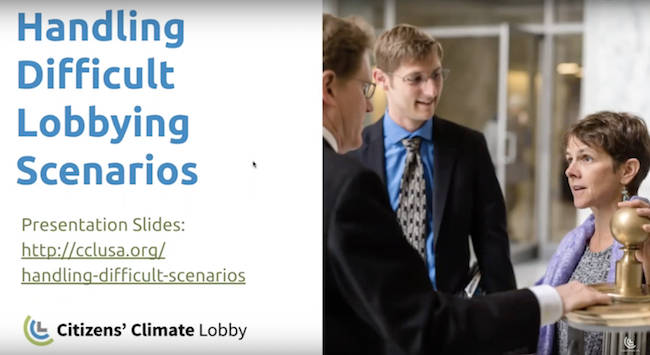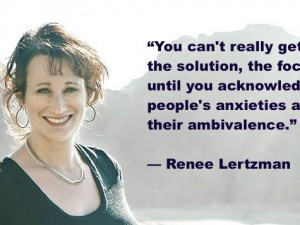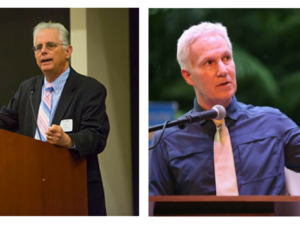Handling difficult lobbying scenarios
By Claire Squire
Political conversations can be tough. With a record number of CCL volunteers signed up to participate in this year’s November Lobby Day, let’s brush up on how to have better conversations about climate change, even when they become challenging.
This Citizens’ Climate University training is led by Pacific Northwest Regional Coordinator Tamara Staton and Southeast Regional Director Don Addu. Don reminds us, we should “stay focused and respond to what [members of Congress] say and hear, not what you think they should hear.” Check out the full training here:
Having better conversations
When meeting with a staffer or member of Congress, remember that your pride and ego are not the priority; building a relationship with the MOC and bolstering support for the bill are the most important objectives. While argumentative zingers may feel good, hostility or demonstration of scientific prowess rarely lead to positive relationships. Remember, CCLers are working on fostering long-term relationships.
The most important phrase for you to use when lobbying is “tell me more.” This allows you to understand a member’s underlying concerns and discover how best to frame the conversation. During the lobby meeting, offer appreciation for their broadly respected achievements—everyone likes to feel appreciated, and showing respect helps build rapport.
Additionally, refrain from making promises that CCL cannot keep, and try not to overstate the benefits of the Energy Innovation Act. For example, though a majority of people will see a financial benefit under this policy, not every constituent will, so do not claim that everyone in the district will be wealthier due to this policy.
How to get out of bad situations
In the event that a lobby meeting begins to go poorly, there are a few ways that volunteers can help the conversation get back on track. If a fellow lobbyist becomes impassioned during a meeting, the lobby meeting Lead should deescalate the situation by appreciating that volunteer’s concerns and then redirecting the conversation to another person. In the unlikely event that staffers become argumentative or difficult, do not become agitated, rather, acknowledge their concerns so that they know they are heard. Don adds, “It’s easy to get derailed by anger and defensiveness, but if you can remember to come from a place of curiosity and validation, it will make all the difference in moving the conversation forward.”
If the lobby group starts to veer off topic, the Timekeeper should pivot back toward the reason the group is in the office. The goal is for talking time to be evenly split between staffers and volunteers. If you are the Lead and know there is a talker in your group, you could consider positioning yourself next to them during the meeting so that you are able to make eye contact, cutting them off.
Role playing your responses
Let’s take one common objection as an example. Imagine that, in a lobbying scenario, a member of Congress says there is no point in the U.S. taking action on climate because India and China will still not take action to reduce their emissions. Someone might also argue that climate action will hurt the U.S. economy because of lax environmental laws in other countries. Watch as Tamara and Don act out examples of bad, better, and best responses to this argument in these video clips. These techniques will help you respond better to any tough conversation.
Bad response:
Notice how in the bad response, Don sought to correct the Congresswoman’s facts, rather than understand her underlying concerns.
Better response:
This time, Don response sounds like he has internalized CCL’s laser talks. He does not retort, but still does not get to the root of her concerns about the policy.
Best response:
In the best response, when confronted with a challenging statement, Don asked the MOC to tell him more, resulting in a deeper understanding of her values and stance on the issue and a more effective lobbying experience.
Regardless of what objections or difficulties come up during your lobby meeting, it is important to remember to connect over shared values. By being committed to CCL’s appreciative bipartisan flavor of advocacy, lobbyists can equip themselves to handle difficult situations with poise.
Claire Squire is an intern with CCL’s Communications team and a second-year Environmental Management student at Indiana University.






